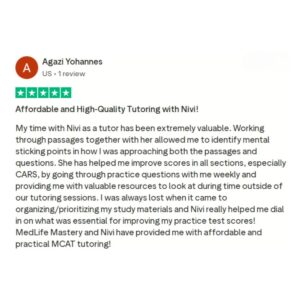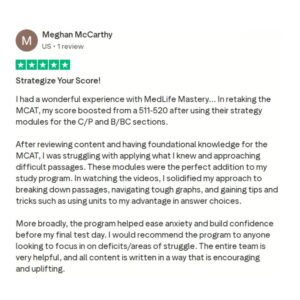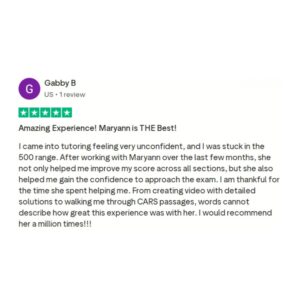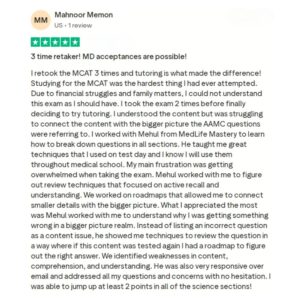If you have learning disabilities and need extra time, the AAMC offers flexible MCAT accommodations for you on test day.
This is a comprehensive MCAT Accommodations guide.
Later we also cover a student's experience with having learning disabilities, plus how you can 'level the playing field' and succeed on the MCAT even when you feel like you're at a disadvantage.
More...
Taking the MCAT exam and getting into medical school should be efficient and accessible to everyone, regardless of impairment, medical condition, or disability.
If your dreams of becoming a doctor are put on hold because you have these conditions that you think would hinder or slow you down, we want to encourage you to keep going...
There are systems and guidelines in place that protect your standing as a person with disability or someone who needs special assistance and accommodation, such as the Americans with Disabilities Act.
The Association of American Medical Colleges (AAMC) also makes sure that these guidelines are in place. In fact on their website, it is highly encouraged for people with disabilities and special conditions to apply for an MCAT accommodations.
What Is An MCAT Accommodation?
They are for test takers who think that their condition might require an adjustment to the standard MCAT testing conditions, thus the need for an accommodated setting or an accommodation.
MCAT accommodations are put in place to ensure that test takers who have impairments, medical conditions and disabilities are still catered and are able to take the exams like the other regular test takers.
What Are The Available MCAT Accommodations?
Depending on your need and request for accommodation, the AAMC is committed to making sure that things are easily and efficiently working for you on your MCAT testing day.
Here are some examples of accommodations that the AAMC can provide for you on test day:
If you require a testing situation that is not similar or close to these accommodations that the AAMC is willing to make, you’ll need to clarify it in your application so they can review your needs and make a decision.
These are only a few of the accommodations that the AAMC will provide. Again, it is all dependent on your condition and which kind of accommodation might ensure that your access remains efficient and in accordance with existing laws and guidelines.
Who needs MCAT Accommodations?
Test-takers who think they have a medical condition or disability that requires changes to the MCAT testing conditions are encouraged to apply for an MCAT accommodation.
The AAMC lists the following conditions or disabilities that may qualify you for a testing change.
It should be noted, though, that this list is not comprehensive and inclusive, so if you think you might need a testing change for MCAT you may still proceed with the application even if your condition is not listed below.
The MCAT Accommodations Application Process
For AAMC to determine if they can offer the accommodation that you require, you need to go through the MCAT accommodations application process first.
Here are the following steps:
This ID will be useful for you because you will use this ID when registering for the MCAT, applying for accommodations, applying to medical school, applying for a residency and more. Don't forget your user ID and password.
The MCAT testing registration is a separate process from the MCAT accommodations application. You will need to register for a regular MCAT testing seat first so that in cases of your accommodation application being denied, you will still have control over the date and time you can take the test.
As of writing this post, all MCAT exams administrations through May 21 have been canceled globally. For more details regarding the impact of the coronavirus pandemic on MCAT testing, visit the AAMC FAQs age.There are varying times to submit your application, depending on what you're aiming to get approved. Many require 60 days, so it's important to do your research. As a general rule, the earlier the better!
There are different actions you can take which depend on whether you have a physical challenge that's permanent (e.g. asthma), temporary (e.g. injury), or a learning disability.
Every application needs to include a customized cover letter which explains your disability and functional impairments.
These need to come attached with medical documentation, plus an evaluation provided by the AAMC.
You must submit your application for accommodations no later than 60 days before the Silver Zone registration deadline (15 days prior to exam date).
You'll receive a letter from the MCAT Accommodations Online (MAO) system that your request has either been approved or denied. If you have been approved, your next step will be to confirm your seat as an accommodated tester. If you are denied, you'll have to show up for your standard testing time.
The MCAT Accommodations Review Process
As stated before, the AAMC policies for approving MCAT accommodations are guided by the Americans with Disabilities Act. They are also trying to provide a valid exam for people with disabilities while also maintaining a level playing field for all test takers.
According to their MCAT Accommodations FAQ page, “it is your current functional limitations (in combination with the demands of the task you will be undertaking), not diagnosis alone, that determines the appropriateness of a requested accommodation.”
MCAT accommodations are granted only to test takers that support their requests with sufficient evidence. Below is an overview of the components that they are looking for within your documentation:
Keep in touch with your care provider or physician so they can also help you with the necessary proof and paperwork that you need to furnish and submit.
Requests for Extensions, Reconsiderations, Appeals, and the MCAT Accommodation Services Financial Benefit (and supporting documentation) should be submitted via email at MCAT_Accoms_Docs@aamc.org. Make sure to only submit your application using the methods listed above to avoid unnecessary delays in the review of your request.
MCAT Accommodations & COVID-19
The AAMC put up a guideline on their website, effective March 13, 2020 (until further notice) that they are unable to receive documentation that are submitted via mail due to COVID-19.
This means that your initial applications should be submitted using the MCAT Accommodations Online (MAO) system.
Here's where you can get MCAT accommodation-related updates in line with the coronavirus pandemic: https://students-residents.aamc.org/applying-medical-school/taking-mcat-exam/mcat-exam-accommodations/
As of writing this post, all MCAT exams administrations through May 21 have been canceled globally. For more details regarding the impact of the coronavirus pandemic on MCAT testing, visit the AAMC FAQs page.
A Student's Personal Experience With Learning Disabilities and MCAT Accommodation Denial
One of our students, who we tutor for the MCAT, who needed MCAT accommodations reached out to us and said...
"I have slight learning difficulties; was diagnosed in 2013 and I requested accommodations back in February and sent AAMC 40 pages of medical documentation. They considered it "incomplete" so I needed to re-apply and push my MCAT date later than it originally was.
I find out this week whether I'm granted 1.5x time but either way all of my scores listed from NS & AAMC are with additional time added. I'm desperate at this point.
I know I deserve a higher score with all the work I put in. I have to work 2x harder than an average individual due to my learning difficulties. I don't even think words can express my frustration and how devastating this is."
If this sounds familiar, we hear you. We're with you. We helped this student achieve her score goal on the MCAT and we're able to help you as well.
If you've been denied MCAT accommodations, you can follow up.
At the end of the day, you she need more time - either to get AAMC to reconsider or to get your testing ability up to par.
But do not take the MCAT if you're nowhere near your score goal close to exam date. It’s just not worth it.
It’s worth delaying if it means getting a competitive MCAT score.
Also never feel any shame about needing more time. Med schools don’t care about it and they’re not going to treat you any differently. You're entitled to more time to like we said, level the playing field.
How To Succeed on the MCAT When You Feel Like You're At A Disadvantage
Regardless of what accommodations we get, sometimes it just feels like we're going to be at a disadvantage no matter what.
We can't even begin to imagine the level of anxiety, uncertainty, and fear that can go through your mind on a day to day basis as you're studying for this beast of an exam. An exam that even those who have 'no disadvantage' struggle with, to the point of breaking down into tears throughout the process.
Not to mention, the panic if you didn't get approved for MCAT accommodations when you KNOW you need it.
If you're in this boat, we're not going to sugar coat it; it's not going to be easy. You'll have to work hard. You'll have to want your dream of being a doctor MORE than you want the struggle to end. This is your story.
When you get to those interviews and med-schools want to know what's 'unique' about you, you now can speak with more passion than anyone else, because the struggle for you was more real than for anyone else.
It's more important for you than anyone else to get guidance and not go at it alone.
Having an MCAT tutor/coach, if it's within your means, is one of the smartest things you can do to make this journey as smooth as possible because you'll have someone holding your hand all the way until test date, supporting you and giving you the tools you need to succeed. You can learn more about working with an MCAT Mastery Mentor here.
The second thing you can do is realize that you can level the playing field. 90% of students who will taking the MCAT with you, didn't prepare in the smartest way. They didn't learn HOW to take the test because they were busy learning WHAT they need to know for the test. This is what differentiates the top scorers from the average.
We know because we've been studying top MCAT scorers for many years - extracting their formula for getting a 90+ percentile score.
Today we have a complete system on HOW to study for the MCAT - the literal blueprint. If you follow that, you can level the playing field. In fact, we can guarantee you'll level the playing field. You can learn more about it here.
Lastly, remember you can do this. You've made it this far. You've written hundreds of exams. This one (bigger) exam is going to keep you from your dreams...
We won't let it.
You got this,
The MedLife Mastery Team
Your "MCAT Success" Mentors


 To help you achieve your goal MCAT score, we take turns hosting these
To help you achieve your goal MCAT score, we take turns hosting these 















